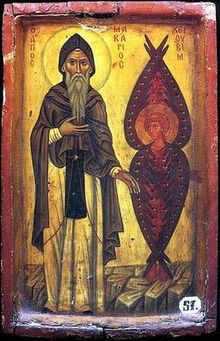How long I lay on my bed sobbing for the one love of my life I do not know. Later, I heard Father’s footsteps coming up the stairs. … Suddenly I was afraid of what Father would say. Afraid he would say, ‘There’ll be someone else soon,’ and that forever afterward this untruth would lie between us. For in some deep part of me I knew already that there would not—soon or ever—be anyone else.
The sweet cigar-smell came into the room with Father. And of course he did not say the false, idle words.
—Corrie ten Boom, The Hiding Place
✠ ✠ ✠
In my last post I talked a little about Theology of the Body and its approach to sexuality. However, I didn’t talk about celibacy, except to note that at first glance, it doesn’t fit neatly into TOB. Since celibacy is implicitly the state of those who won’t or can’t marry, it’s extremely important—even apart from any question of homosexuality—so I’d like to take a crack at understanding celibacy in the same context.
St Macarius the Great, one of the earliest of the Desert Fathers, with a Cherub.
To do so properly, first, a few words on what celibacy is not. It isn’t running away from sex; that is, people do run away from sex, for lots of reasons, such as fear of intimacy or disease or responsibility; but a mature and integrated celibacy cannot be based on fear. Any renunciation of marriage or of sex that consists in aversion or enmity to the sexual nature of the body is essentially un-Christian, and, in Christians, a serious inconsistency. One reason that the primitive Church was so fiercely opposed to the Gnostic religions, even though they shared a deep reverence for virginity, was precisely that the Gnostics’ asceticism was based on despising the body. A Christian, by contrast, has always been permitted to discipline the body, and even to train it with great rigor; but he trains it as a soldier—he must not brutalize it like a jailer.
To get an idea of what Christian celibacy rightly flows from, I turn to St Paul:
All things are lawful for me, but all things are not expedient: all things are lawful for me, but I will not be brought under the power of any. Meats for the belly, and the belly for meats: but God shall destroy both it and them. Now the body is not for fornication, but for the Lord; and the Lord for the body. And God hath both raised up the Lord, and will also raise us up by his own power. Know ye not that your bodies are the members of Christ? … Every sin that a man doeth is without the body; but he that committeth fornication sinneth against his own body. What? Know ye not that your body is the temple of the Holy Ghost, which is in you, which ye have of God, and ye are not your own? For ye are bought with a price; therefore, glorify God in your body, and in your spirit, which are God’s.1
The body is for the Lord, and the Lord for the body. That is an extremely weird thing to say—partly because since when is the Lord for anything? I am by no means sure that I understand what St Paul is saying in that verse, but what I think he’s saying is something like this.
The body is the self as gift. Now, God’s design for sex is that we give ourselves completely—not withholding our future, or our fertility, or the integrity of an undivided heart—to one other person; and from this gift of self comes the family. But as glorious as that is, God didn’t design us only for familial happiness, still less only for sexual pleasure. To give sexually is one mode of the gift of self, but it is a mode that is, of itself, intimately bound up with time: the impermanence of everything we see, the subjection of creation to decay and death, is suggested by the whole scheme of sexual reproduction.2
To beget and rear children is, when you come to think of it, a rather fine act of defiance of the apparent futility of the world. For a creature that knows its life will end to choose to bring new life into the world, though it is doomed to die in its turn, can be a bold refusal of the despair death seeks to impose on us; it has a flavor of the absurd in Camus’ sense, or of Henley’s Invictus.
To beget and rear children is, when you come to think of it, a rather fine act of defiance of the apparent futility of the world. For a creature that knows its life will end to choose to bring new life into the world, though it is doomed to die in its turn, can be a bold refusal of the despair death seeks to impose on us; it has a flavor of the absurd in Camus’ sense, or of Henley’s Invictus.
But without something more to the universe than a grand futility to defy, followed perhaps by a ghostly eternity, the defiance (if I may trust my own instincts) is going to pall horribly before the end. We need and want something more. We want something that’s forever, of which romantic love itself is an image—hence erotic love’s indefatigable habit of promising perpetual fidelity, despite the fact that, without the guidance of good thinking and good character, it’s as fickle as a whiskey dick.
I believe this is what the Church means when she describes celibacy as eschatological. To be a celibate, to renounce marriage and fertility for the sake of that something more, points to the end of time, when the economy of generation and corruption will cease to operate, and life as we know it will be taken up into a new kind of life: continuous with the old, but as different from it as a flower from a seed, or a butterfly from a caterpillar.
The body is for the Lord, and the Lord for the body. I am out of my depth here. Yet I can’t help thinking, also, of one of the accounts of the Last Supper,3 which records Jesus’ words about the bread, not that it was given or broken, but simply: This is my body, which is for you. And then: I fill up in my body what is lacking in the sufferings of Christ for the sake of his body.4
Is there some sense in which the body of the celibate is for others? I think that there must be, if only because, for the Christian, everything is for others: Even the anchorite who meditates alone, / For whom the days and nights repeat the praise of God, / Prays for the Church, the Body of Christ incarnate.5 But in the same sense as the Eucharist? Isn’t that presumptuous, even blasphemous?
I don’t know. Certainly our bodies don’t confer supernatural life the way His does. Even when they are made a medium of grace to others, they are precisely a medium that conveys grace, whereas His contains that grace in Its own right. Yet at the same time, if (as St Peter says) we are all priests, we are priests of that single Sacrifice, spread throughout time and space. Only a few of us are Its priests in the sense of confecting and administering It in Its substantial form; all of us are priests of Its spirit and operation in the world. I don’t think it’s impossible that our bodies may—in a way, maybe, that we don’t understand or even perceive—be reserved from the sexual gift in order to be available as an invisible and supernatural gift to sustain others.
How that should be, I’ve no clue. I don’t even know that it’s the case. My last post had a little speculative theology; this is nearly all speculative.
The obvious explanation would be that the celibate has an undivided heart to devote to God and His people, and, as a brute fact, more time at his or her disposal. This seems to be what St Paul is talking about in I Corinthians 7. But something in me revolts against that explanation; merely having more time and attention to give to others seems like a very petty exchange for what seems to be, for most people, the greater part of earthly happiness. (Of course, I say that as someone who’s never been married and may not have any idea what he’s talking about.)
I feel as if I have some inkling of another and mysterious explanation, but I can’t articulate it, even to myself. The closest I’ve ever come is by analogy with this strange passage from Charles Williams’ The Forgiveness of Sins,6 discussing not sexuality but bloodshed:
Those who sincerely reject the Single Sacrifice may be driven back on the many types of it, even if—no, because the centrality of all the types is unacknowledged. But belief in the Single must refuse the multiplicity. The Rite of the shedding of blood for atonement or for achievement is accomplished. No other shedding of that kind is allowed, unless God permits and enforces [it] by physical states or spiritual or both. Women’s periods present the one; the death of martyrs the other; the Eucharist both.
I’ve never seen any other theologian explain, or try to explain, the spiritual significance of menstruation; but Williams was a mystic, that is, a realist, and knew well that if we are to take God’s creation of man seriously then we must actually take it seriously.
How could this truth—supposing that it is a truth—be true of the body of the celibate? I don’t know. I may find out one day but I don’t know now. In what way fertility, that is, the gift of life, can be communicated from an abstinent body … the only model that I know of is the Eucharist. How that can apply to our bodies and lives, I don’t know.
✠ ✠ ✠
1I Corinthians 6.12-15a, 18b-20, King James Version. For a more modern translation, click here.
2Maybe if humanity had not fallen, sexuality would be radically different in ways we probably can’t imagine. Or, alternatively, maybe we would have filled the earth and subdued it, and then stopped reproducing, transcending sexuality as we know it in a way that, again, we probably can’t imagine. But we would certainly have been sexual beings: original sin damaged and weakened us, but it didn’t change what we are as beings. Regardless, sexuality as we know it is bound up with the time process that, for us, means the inevitably of death.
3Specifically, that related by St Paul in I Corinthians 11.23-25. There is some variation among the manuscripts of this passage—some ancient authorities do include broken or given—but the bare which is for you is doubtless the correct reading, the participles probably being added (perhaps accidentally) by later copyists on analogy with the accounts in the Gospels.
4Colossians 1.24.
5T. S. Eliot, Choruses from ‘The Rock,’ II.41-43.
6And when someone goes out of their way to call something Charles Williams wrote strange, you’re in for a doozy. (This quotation comes from p. 196 in my copy, which is published in a single volume with He Came Down from Heaven.)




.jpg)

